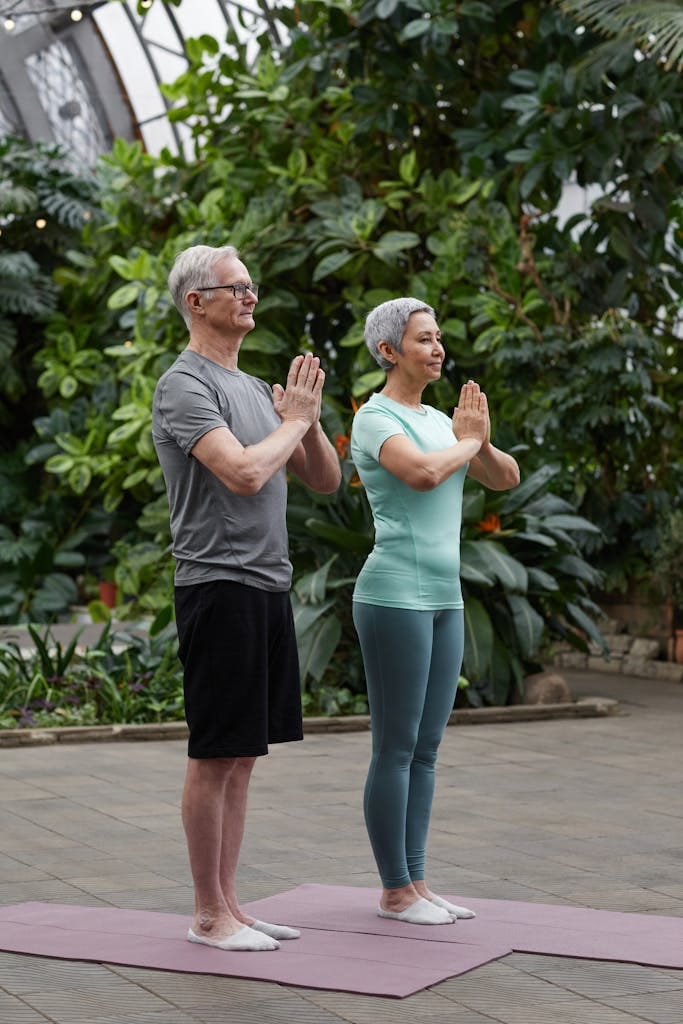FREE SHIPPING OVER $50
Future-Proof Your Brain: The “Anti-Aging” Exercise Routine Doctors Recommend to STOP Dementia & Memory Loss
The idea of living a long, healthy life is appealing to everyone. But what about the quality of that life, especially as we age? For many, the biggest fear isn’t just growing old, but losing the very essence of who we are – our memories, our ability to think clearly, our independence. The specter of dementia and memory loss, particularly conditions like Alzheimer’s disease, looms large.
While genetics and other factors play a role, mounting scientific evidence and the consensus among doctors and longevity experts point to one potent, accessible, and enjoyable tool in our arsenal: exercise. Yes, the same activity that strengthens your muscles and heart can literally help future-proof your brain and act as a potent anti-aging exercise routine to stop dementia & memory loss.
The Brain-Body Connection: Why Movement is Medicine for Your Mind

Here’s why regular exercise is considered a powerful “anti-aging” therapy for your brain:
- Boosts Blood Flow to the Brain: Your brain needs a constant, robust supply of oxygen and nutrients. Exercise increases cerebral blood flow, ensuring your brain cells get the fuel they need to function optimally and efficiently.
- Stimulates Neurogenesis: Believe it or not, your adult brain can grow new brain cells! This process, called neurogenesis, primarily occurs in the hippocampus, a brain region crucial for learning and memory. Exercise, particularly aerobic activity, has been shown to stimulate this growth.
- Enhances Neurotrophic Factors: Exercise increases the production of vital proteins like Brain-Derived Neurotrophic Factor (BDNF). BDNF acts like “Miracle-Gro” for your brain cells, promoting their growth, survival, and strengthening connections between them (synaptic plasticity), which is vital for learning and memory.
- Reduces Inflammation: Chronic low-grade inflammation is a major contributor to cognitive decline and neurodegenerative diseases. Exercise is a powerful anti-inflammatory, helping to protect delicate brain tissue.
- Balances Blood Sugar: Exercise helps regulate blood sugar levels, preventing insulin resistance, which is increasingly linked to Alzheimer’s disease (sometimes called “Type 3 Diabetes”).
- Manages Stress & Improves Mood: Stress hormones like cortisol can damage brain cells over time. Exercise is a fantastic stress reliever, reducing cortisol and boosting mood-enhancing neurotransmitters like serotonin and dopamine, indirectly protecting brain health.
- Clears Toxins: Physical activity may enhance the glymphatic system, the brain’s waste removal system, helping to clear amyloid-beta plaques associated with Alzheimer’s.
Clearly, exercise isn’t just about looking good; it’s about preserving the very essence of who you are. It’s the ultimate anti-aging strategy for your mind.
The “Anti-Aging” Exercise Routine Doctors Recommend to STOP Dementia & Memory Loss
So, what kind of exercise are doctors recommending for brain health and longevity? The good news is that you don’t need to become an elite athlete. A combination of specific types of movement, performed consistently, delivers the best results.
Here’s the anti-aging exercise routine for your brain:
1. Aerobic Exercise (Cardio)
- Why it’s Crucial: This is often considered the cornerstone of brain-boosting exercise. Activities that get your heart rate up and blood pumping are fantastic for increasing blood flow to the brain, stimulating neurogenesis, and enhancing BDNF.
- What Doctors Recommend: Aim for at least 150 minutes of moderate-intensity aerobic exercise per week, or 75 minutes of vigorous-intensity aerobic activity. This can be broken down into shorter, manageable chunks.
- Examples: Brisk walking, jogging, swimming, cycling, dancing, hiking, using an elliptical, or even power-walking. The key is to get your heart rate up so you’re breathing harder but can still hold a conversation (moderate intensity).
- How it Helps STOP Dementia & Memory Loss: Directly improves brain structure and function, enhances memory, and can slow the rate of cognitive decline.
2. Strength Training (Resistance Training)
- Why it’s Crucial: While cardio boosts blood flow, strength training builds muscle, which acts as an endocrine organ, releasing compounds that are beneficial for the brain. It also improves insulin sensitivity and reduces inflammation.
- What Doctors Recommend: Engage in strength training 2-3 times per week, targeting all major muscle groups. You can use bodyweight, resistance bands, free weights, or machines.
- Examples: Squats, lunges, push-ups, planks, bicep curls, triceps dips, rows. Focus on proper form and progressive overload (gradually increasing resistance or repetitions).
- How it Helps STOP Dementia & Memory Loss: Supports overall metabolic health, which in turn protects the brain. Builds muscle that may release myokines beneficial for brain health, and improves physical function, reducing fall risk which can lead to brain injury.
3. Balance & Coordination Exercises
- Why it’s Crucial: As we age, balance can decline, increasing the risk of falls. Balance exercises strengthen the neural pathways between your brain and muscles, improving proprioception (your body’s sense of its position in space) and preventing injuries that can indirectly impact brain health.
- What Doctors Recommend: Incorporate balance exercises a few times a week, ideally daily, for a few minutes.
- Examples: Standing on one foot (progress to eyes closed), heel-to-toe walking, Tai Chi, yoga, walking backward or sideways.
- How it Helps STOP Dementia & Memory Loss: Directly challenges and strengthens brain regions involved in motor control and spatial awareness. Reduces risk of head injuries from falls.
4. Mind-Body Practices (Yoga, Tai Chi)
- Why it’s Crucial: These practices combine physical movement with mindfulness, breathing techniques, and meditation. They are excellent for stress reduction, which is a significant factor in cognitive decline. They also improve focus, balance, and flexibility.
- What Doctors Recommend: Practice mind-body exercises regularly, 1-3 times per week, or even short daily sessions.
- Examples: Yoga, Tai Chi, Qigong. These are also fantastic for improving coordination and balance.
- How it Helps STOP Dementia & Memory Loss: Reduces chronic stress (lowering cortisol), improves sleep quality, and enhances executive function, all of which are protective for the brain.
5. High-Intensity Interval Training (HIIT) (If Appropriate)
- Why it’s Crucial: For those who are already physically active and cleared by a doctor, HIIT involves short bursts of intense activity followed by brief recovery periods. It’s incredibly efficient for cardiovascular health and has shown promise in boosting BDNF and improving cognitive function.
- What Doctors Recommend: Consult with a doctor before starting HIIT. If suitable, 1-2 sessions per week can be highly beneficial.
- Examples: Short sprints (running, cycling), intense bursts on an elliptical, or bodyweight circuits with minimal rest.
- How it Helps STOP Dementia & Memory Loss: Maximizes blood flow and neurotrophic factor release in a short period, potentially offering intense brain benefits.
Future-Proofing Your Brain: Actionable Steps for Longevity
It’s clear that an anti-aging exercise routine is vital for longevity and helps to stop dementia & memory loss. Here’s how you can make it a consistent part of your life:
- Start Small, Be Consistent: Don’t feel overwhelmed. If you’re new to exercise, begin with 10-15 minutes of brisk walking daily and gradually increase. Consistency is far more important than intensity in the beginning.
- Find What You Enjoy: The best exercise is the one you’ll actually do. Whether it’s dancing, gardening, swimming, or brisk walks with a friend, choose activities that bring you joy.
- Mix It Up: Incorporate a variety of the types of exercise mentioned above. A combination of aerobic, strength, and balance training offers the most comprehensive brain protection.
- Make It Social: Exercise with friends or join a class. Social engagement also contributes positively to brain health.
- Listen to Your Body: Rest when needed, and don’t push through pain. Consult your doctor before starting any new exercise regimen, especially if you have underlying health conditions.
- Make It a Habit: Schedule your workouts like any other important appointment. Over time, it will become an ingrained part of your day.
Final Thoughts
The science is unambiguous: exercise is a powerful, accessible, and enjoyable way to future-proof your brain. The doctors recommend it because it works – by boosting blood flow, sparking new brain cells, reducing inflammation, and enhancing overall cognitive function.
By incorporating consistent, varied movement into your daily life, you’re not just investing in your physical health; you’re safeguarding your memories, your clarity of thought, and your independence for decades to come. So, lace up those shoes, find your favorite way to move, and start building your ultimate defense for a vibrant, sharp mind. Your future self will thank you.
Related Articles
- At 82, He’s Still Hitting the Gym—And Says This Diet Is the Reason
- According to a Physical Therapist, You’re Probably Weak in This One Key Area—Here’s How to Fix It
- Scientists Found 10 Ways to Reverse Aging After 50—Why Aren’t We All Doing This?
- 5 Supplements That Won’t Help You Live Longer (Sorry, But You’re Wasting Your Money)
- Stop Losing Muscle After 40—Here’s How to Keep Strength Like a Pro







